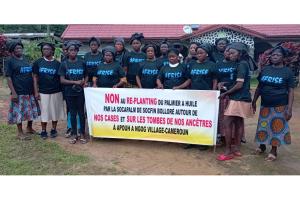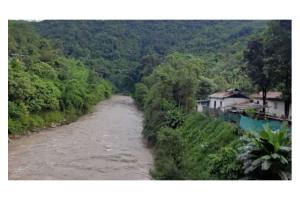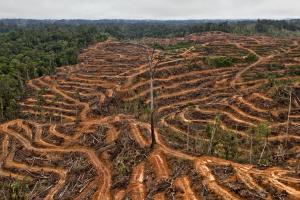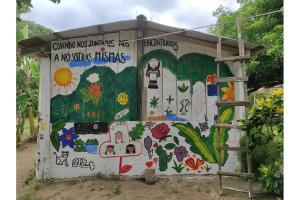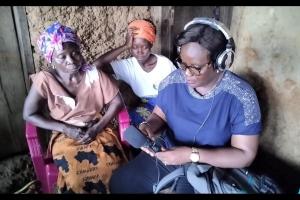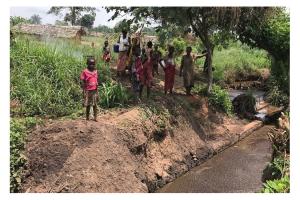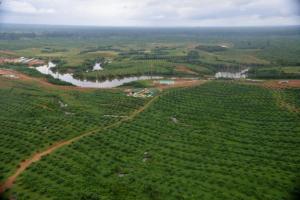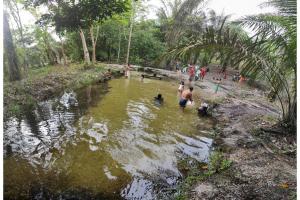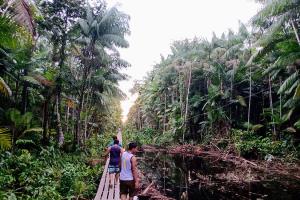Palm Oil
The oil palm tree is native to West Africa. It is an important tree for forest-dependent communities, their cultures and their economies. However, large-scale oil palm monocultures for industrial production (oil and agrofuels) have been driving deforestation and land grabbing in Southeast Asia. More recently, oil palm monocultures are also driving destruction in Africa and Latin America.
Bulletin articles
19 December 2023
The Afrise women's association launched an international petition to stop the replanting of oil palm monocultures around their homes and over the grave sites of their ancestors. They are denouncing decades of sexual abuse, land dispossession and misery. They are demanding that their territory be returned to them, so that they can lead a life of dignity.
Bulletin articles
25 October 2023
Land related struggles in India’s Northeast states might worsen with the push to expand oil palm plantations on small-farmers and Indigenous land, threatening their food sovereignty and the ancestral practice of Jhum (shifting cultivation). On top of this, a new Forest Amendment Law will facilitate this expansion, jeopardizing further the region’s forests and Indigenous Peoples.
Bulletin articles
22 July 2023
This article tells the story of a women group in Kalimantan called “Hurung Hapakat”, which means “Working Together”. Collectively, and against serious repression, they have reclaimed some land from oil palm plantations in order to also reclaim their food sovereignty, dignity and wisdom. And they are not alone.
Bulletin articles
22 July 2023
Women's organizations are resisting the advance of a monoculture crop that is invading their lands and bringing scarcity and water pollution. In this podcast, they explain their situation and their struggle. The podcast was produced by the groups Women of the Chiapas Coast against Oil Palm and Coastal Women in Rebellion, in collaboration with WRM.
Bulletin articles
16 January 2023
Oil palm plantations are a central cause of deforestation in southeast Mexico. A network of women in Chiapas have organized to denounce the tactics of coercion and deception employed by the State and companies to get peasants to accept this monoculture on their lands. Their struggle is for the land, for their knowledge, and for their voices to be heard.
Bulletin articles
16 January 2023
Oil palm plantation company Socfin has meant violence and oppression for affected communities in several African countries. Sierra Leone is no exception. In collaboration with Aminata Finda Massaquoi, a journalist and the national coordinator of the women’s advocacy network WORNAPI, WRM is releasing a podcast to highlight the voices of women living with the impacts of industrial plantations.
Bulletin articles
11 October 2022
This bulletin highlights materials and analysis related to communities’ struggles against industrial tree plantations. It also pays homage to communities in DRC struggling to get their lands back from an oil palm company since colonial times. Their courageous struggle showcases the multiple layers of oppression and violations that result from the plantation model.
Bulletin articles
11 October 2022
The oil palm plantations of BIDCO, a company partially owned by Wilmar, in Kalangala Island, Uganda, generated devastating impacts. The company plans to expand to Buvuma Island, however, they keep confronting strong organized opposition! Watch a short video with testimonies of resistance from Buvuma Island.
Bulletin articles
11 October 2022
The Informal Alliance Against the Expansion of Industrial Oil Palm Plantations in West and Central Africa released a declaration to keep breaking the silence of the many abuses around industrial plantations and to reaffirm their strong commitment to resist their expansion in the defence of their territories and lives.
Bulletin articles
12 September 2022
Industrial palm oil production in West and Central Africa is mainly controlled by five multinational corporations, and could continue expansion. Plantations take up large tracts of land. Land and water are interdependent. Yet, the current water crisis in these territories would not exist if corporations had not grabbed the land from communities.
Bulletin articles
12 September 2022
There is no other crop that has grown faster globally in the last decade than palm oil. This almost uncontrollable expansion leaves a deep trail of destruction and conflicts around its giant areas of plantations from Southeast Asia to West and Central Africa. As companies take over more community land, they also grab the water sources from them.
Bulletin articles
16 June 2022
Fossil fuels are at the root of the climate chaos – but the conditions for this crisis have been created by the interconnections and dependencies between colonialism, racism, patriarchy and class exploitation. To address climate chaos, therefore, it is necessary to address the unequal relationships of power upon which a fossil-fuel dependent capitalism is based.
